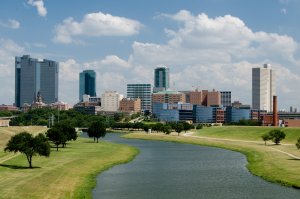
Drug & Alcohol Addiction Treatment Centers in Fort Worth, Texas

Fort Worth, Texas is home to around 5 million people, and approximately 13% of residents admitted to using an illicit drug in the past year. In addition, around 8% of the population meets the criteria for a substance use disorder.1
Tarrant County, home to Fort Worth, has 45 licensed treatment facilities.2
If you or your loved one needs addiction treatment, this page can offer you information about your options for Fort Worth drug treatment centers, including Greenhouse Treatment Center in Grand Prairie.
Call to speak with a knowledgable admissions navigator.
Where is Addiction Treatment Located in Fort Worth, TX?
If you are seeking treatment at a Fort Worth rehab program, there are numerous options as Fort Worth is a major metropolitan area located in North Texas, close to the city of Dallas. Treatment centers are located throughout the Fort Worth area. Greenhouse Treatment Center, operated by American Addiction Centers, is located in Grand Prairie, Texas, which is only a short drive from Fort Worth. There are more than 500 treatment facilities in Texas, most of which are in the Dallas-Fort Worth metropolitan area, Austin, San Antonio, or Houston.2
Levels of Care in Fort Worth Rehab Centers
Rehab facilities in Fort Worth may offer many different levels of treatment. These may include:3
- Medical detox. Used to help patients through acute withdrawal under medical supervision, detox is often a necessary first step in treatment. Medical detox is much more effective when patients continue treatment afterward.
- Inpatient treatment. Inpatient or residential care requires patients to live at the facility 24/7, benefiting from around-the-clock care and a structured daily routine.
- Outpatient treatment. Outpatient treatment utilizes many of the same treatment approaches used in inpatient care but allows patients to live at home, visiting the facility at intervals determined by clinical staff.
Outpatient Treatment in Fort Worth
Outpatient care can be a great option for patients with safe and stable living environments and a low chance of relapse. There are various levels of outpatient treatment that may be offered in Fort Worth. This may include:4
- Partial hospitalization program (PHP). This level of outpatient treatment requires patients to visit the facility for treatment 5-7 days a week for a weekly minimum of 20 hours.
- Intensive outpatient program (IOP). IOPs require 3-5 days in treatment for a weekly minimum of 9 hours.
- Standard outpatient treatment. Standard outpatient treatment affords more flexibility in terms of scheduling. The frequency and duration of treatment sessions are determined by clinicians according to the patient’s needs.
Do Rehab Centers in Fort Worth Treat Alcohol and Drug Addiction?
Fort Worth rehab programs treat all forms of alcohol and drug addiction. Statistics show that alcohol is the most widely used substance in Texas.5 Around 6% of people ages 12 and older in Texas meet the criteria for an alcohol use disorder.1 Marijuana is a commonly used illicit drug and was cited as the primary drug for 23% of people admitted to treatment.5 Fort Worth rehab programs also provide treatment for addiction to the following substances:
- Prescription opioids.
- Hallucinogens.
- Cocaine.
- Amphetamines.
- Methamphetamine.
- PCP.
- Benzodiazepines.
- Stimulants, including prescription drugs.
Most programs do not specialize in treating one type of substance use disorder but treat all types of substance use disorders in one treatment program.
What is the Cost of Rehab in Fort Worth, TX?
In Texas, most treatment programs accept private or state-funded insurance. Around 71% of programs accept private health insurance. Around 50% of treatment programs accept Medicaid and around 35% accept Medicare.2 The Greenhouse Treatment Center accepts numerous private insurance plans, including Kaiser Permanente and United Healthcare. If you do not have insurance, programs can often work with you to set up a private payment arrangement, including a payment plan or alternative financing for treatment. In addition, Texas has many state-funded rehab options.2
Does Insurance Cover Drug Rehab in Fort Worth ,TX?
Yes, the majority of Fort Worth, Texas rehab centers accept private or state-funded insurance. Greenhouse Treatment Center accepts private insurance plans through large companies such as Aetna, Cigna, United Healthcare, and more. We also work with TRICARE and the Veterans Affairs Community Care program to provide unparalleled care for those who have served in the armed forces, as well as their family members.
Can I Go to Rehab Without Insurance?
If you don’t have private health insurance or if paying out of pocket isn’t possible, you can still attend free rehab or low-cost treatment in Dallas. 49.6% of Texas facilities offer what is called a “sliding scale” fee for those who pay privately or do not have health insurance.5 You can also consider state-funded rehabs in the city of Dallas that offer treatment at little to no cost. Fill in the form below to see if your insurance provider may be able to cover all or some of the cost of treatment.
Why Choose American Addiction Centers for Rehab in Fort Worth?
At Greenhouse Treatment Center, and all AAC treatment programs, evidence-based practices are provided by caring masters-level staff members who are fully licensed in both addiction and mental health. At AAC, you will receive individualized treatment, including treatment for co-occurring disorders. Also at AAC, we offer a 90-day promise to our clients, which means that if you relapse within a year of attending 90 consecutive days of treatment at one of our facilities, you can receive up to 30 days of free treatment at an AAC rehab program.
Greenhouse Treatment offers a range of rehab treatment options, including inpatient treatment, outpatient treatment, and recovery residences, also known as sober living programs. Call to speak verify your insurance and start treatment today.


